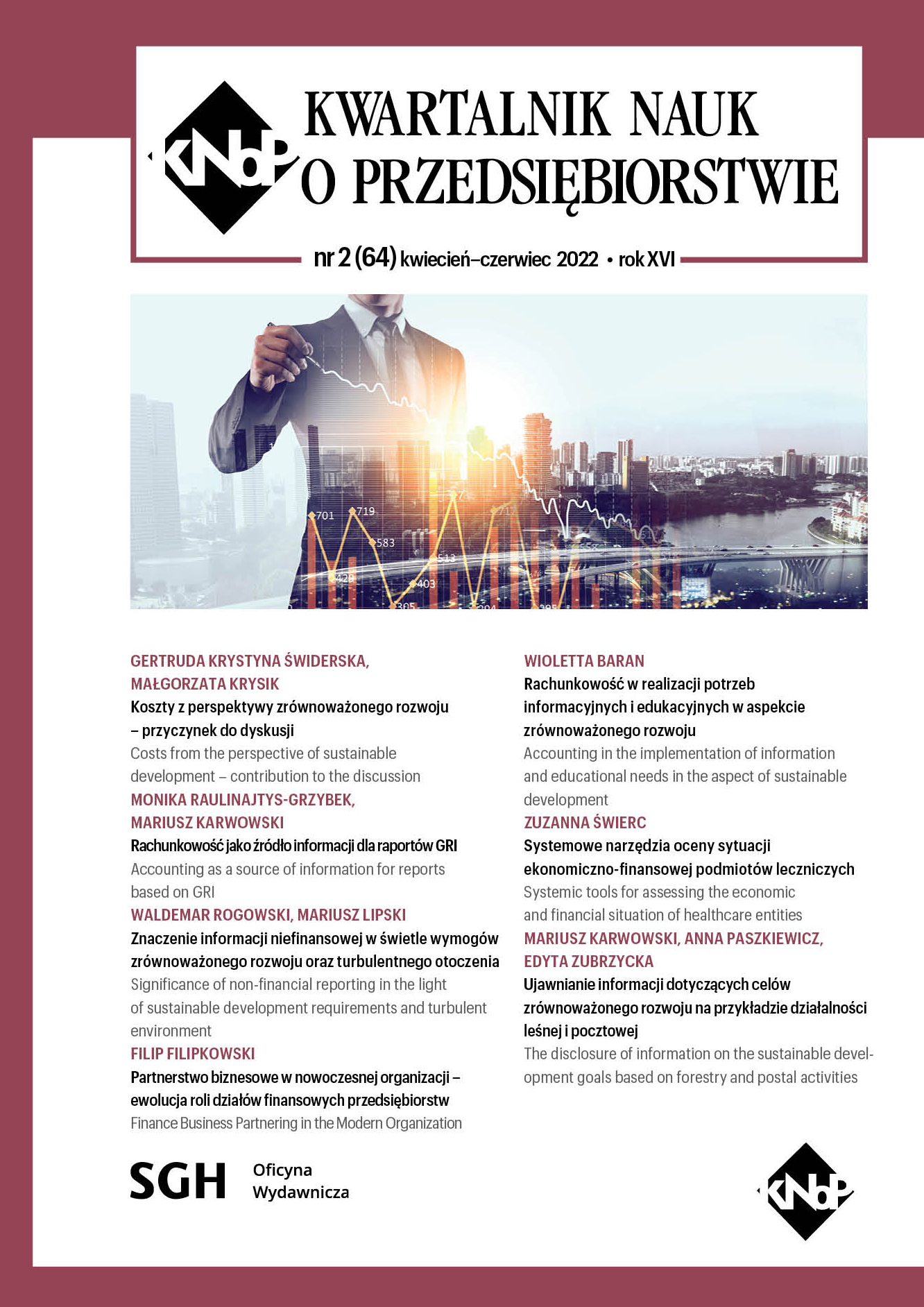Accounting in the implementation of information and educational needs in the aspect of sustainable development
Main Article Content
Abstract
The article concerns accounting as an information system responding to economic and social needs, both informative and educational. The topic is justified by the belief that both science, its application in practice, and the education itself are realized in response to the needs of society and its development. Development, on the other hand, is part of the future, which, as a rule, should only be better, to which the concept of sustainable development refers. The aim of the article is to present accounting as a sustainable system of providing information to meet economic, social and educational needs, which is important in taking actions for sustainable development. Theoretical considerations concern accounting as a sustainable accounting information system and selected aspects of education as an important area in the pursuit of sustainable development. The illustration of selected educational aspects presents the possibilities of education in accounting. In addition to publicly available information of the possibilities of education in the field of accounting, an in-depth case study was used regarding the studies at the Warsaw School of Economics. The obtained research results indicate that accounting is a balanced information system and an example of a balanced system in education. In both aspects, it is a system that responds to t e needs defined as part of activities undertaken for sustainable development.
Downloads
Article Details
The author of the article declares that the submitted article does not infringe the copyrights of third parties. The author agrees to subject the article to the review procedure and to make editorial changes. The author transfers, free of charge, to SGH Publishing House the author's economic rights to the work in the fields of exploitation listed in the Article 50 of the Act of 4 February 1994 on Copyright and Related Rights – provided that the work has been accepted for publication and published.
SGH Publishing House holds economic copyrights to all content of the journal. Placing the text of the article in a repository, on the author's home page or on any other page is allowed as long as it does not involve obtaining economic benefits, and the text will be provided with source information (including the title, year, number and internet address of the journal).
References
Barrett A. M., Chawla-Duggan R., Lowe J., Nikel J., Ukpo E. (2006), The concept of quality in education: A review of the ‘international’ literature on the concept of quality in education, “EdQual RPC”, https://www.edqual.org/publications/workingpaper/edqualwp3.pdf/at_download/file.pdf
Bąk M., Orzeszko T. (2017), Zrównoważony rozwój rachunkowości – analiza zjawiska i determinanty kreujące, „Prace Naukowe Uniwersytetu Ekonomicznego we Wrocławiu”, nr 479.
CIMA (2015), CIMA Code of Ethics for Professional Accountants, https://www.cimaglobal.com/Professionalism/Ethics/CIMA-code-of-ethics-for-professional-accountants/ (dostęp: 9.03.2022).
Czapla M., Kazimierczak-Grygiel E. (2011), Strategie w edukacji dla zrównoważonego rozwoju, NEODIDAGMATA 31/32, https://www.researchgate.net/publication/277137221, (dostęp: 9.03.2022).
Drury C. (2011), Management & Cost Accounting, Business Press, South-Western Cengage Learning.
Fatyga B. (2005), Edukacja nieformalna w Polsce: historia i formy współczesne, w: Doświadczać uczenia. Materiały pokonferencyjne, J. Kaczanowska (red.), Program Młodzież, Warszawa.
Gray R., Bebbington J. (2001), Accounting for the Environment, Seccond edition, SAGE Publications, London–Thousand Oaks–New Delhi.
Harper, H. V. (2016), Risk-Related Activism: The Business Case for Monitoring Nonfinancial Risk, “Journal of Corporation Law”, 41:647–704, http://dx.doi.org/10.2139/ssrn.2478121 (dostęp: 9.03.2022).
IMA (2008), Draft Statement on Management Accounting: Definition of Management Accounting and Management Accountants, “Strategic Finance”, vol. 90, nr 2.
Karwowski M. (2015), Model biznesu jako nowe wyzwanie sprawozdawczości zewnętrznej, „Prace
Naukowe Uniwersytetu Ekonomicznego we Wrocławiu”, nr 388, s. 255–262.
Komisja Europejska (2017), Kolejne kroki w kierunku zrównoważonej przyszłości Europy, https://ec.europa.eu/info/strategy/international-strategies/sustainable-development-goals/eu-approach-sustainable-development_pl (dostęp: 9.03.2022).
Kumar K. (2010), Quality in education: Competing concepts, Contemporary Education Dialogue, 7 (1), s. 7–18, https://journals.sagepub.com/doi/10.1177/0973184913411197
Laurie R., Nonoyama-Tarumi Y., Mckeown R., Hopkins Ch. (2016), Contributions of Education for Sustainable Development [ESD] to Quality Education: A Synthesis of Research, “Centre for Environment Education”, 10 (2), s. 226–242.
Lotz-Sisitka H. (2013), Conceptions of quality and ‘learning as connection’: Teaching for relevance, “Southern African Journal of Environmental Education”, 29.
Pollman, E. (2019), Corporate Social Responsibility, ESG, and Compliance, “Loyola Law School, Los Angeles Legal Studies Research Paper” No. 2019–2035, doi: 10.2139/ssrn.3479723.
Polski Komitet ds. UNESCO (2006), UNESCO a Dekada Edukacji dla Zrównoważonego Rozwoju, https://www.unesco.pl/edukacja/dekada-edukacji-nt-zrownowazonego-rozwoju/unescoa-zrownowazony-rozwoj/ (dostęp: 9.03.2022).
Rozporządzenie Ministra Pracy i Polityki Społecznej z dnia 27 kwietnia 2010 r. w sprawie klasyfikacji zawodów i specjalności na potrzeby rynku pracy oraz zakresu jej stosowania, Dz. U. Nr 82, poz. 53.
Sobańska I., Walińska E. (2018), Przyczynek do postrzegania struktury współczesnego systemu rachunkowości, „Zeszyty Teoretyczne Rachunkowości”, 96 (218), https:// doi.org/10.5604/01.3001.0011.6175
UNESCO (2005), Decade of Education for Sustainable Development, 2005–2014: the DESD at 29 a glance, https://unesdoc.unesco.org/ark:/48223/pf0000141629 (dostęp: 9.03.2022).
UNESCO (2012), Shaping the Education of Tomorrow; 2012 Report on the UN Decade of Education for Sustainable Development, Abridged, UNESCO, Paris, France, https://sdgs.un.org/sites/default/files/publications/919unesco1.pdf (dostęp: 9.03.2022).
IFAC (2020), Handbook of the International Code of Ethics for Professional Accountants, https://www.ethicsboard.org/publications/2020‑handbook-international-code-ethics-professionalaccountants (dostęp: 9.03.2022).

